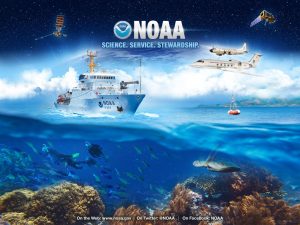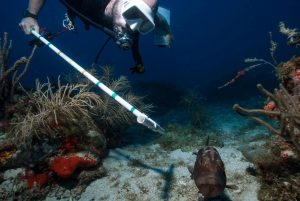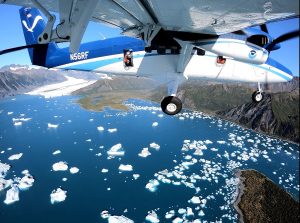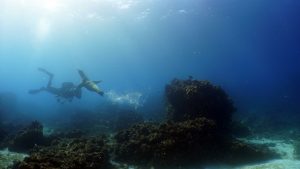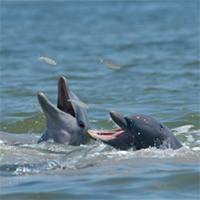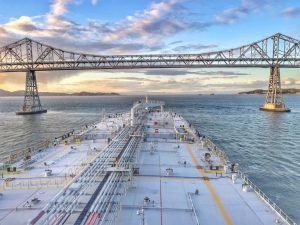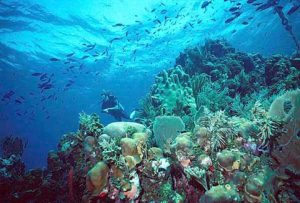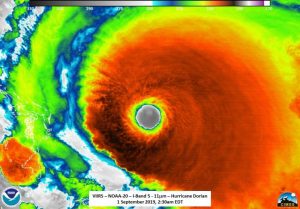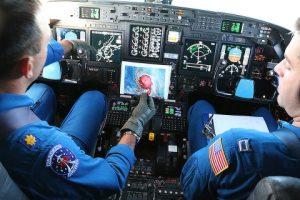Monitoring Weather Around the World ** Smithsonian National Air and Space Museum NOAA Family Day”
NOAA Live! All Stars: Tim Walsh, NOAA Satellite Service in Suitland, MD Ellen Ramirez, NOAA Satellite Service in College Park, MD CDR Jason Mansour, NOAA’s Aircraft Operations Center in Lakeland, FL Greg Heavener, NOAA’s National Weather Forecast Office in Pueblo, CO Part of the Soar Together @ Air and Space NOAA Family Day. This…
Read MoreFin-tastic Fun with Coral Reef Fish Surveys in South Florida and the Caribbean
Erin Cain and Jay Grove, NOAA’s Southeast Fisheries Science Center in Key Biscayne, FL Take a dive with us into coral reef fish communities and learn all about how we identify, survey, and help inform managers about reef fish populations through NOAA’s National Coral Reef Monitoring Program (NCRMP). Using engaging, interactive photos and videos, we…
Read MoreScience in the Sky: How NOAA’s Aircraft Operations Center supports research from 500 to 45,000 ft.
NOAA’s Aircraft Operations Center in Lakeland, FL Want to fly with NOAA? NOAA aircraft are used to measure conditions in a hurricane, count marine mammals, map our coastline, and even measure water content in snow. NOAA’s Aircraft Operations Center manages, operates, and maintains 10 specialized aircraft to support NOAA research. Come and learn about our…
Read MoreSaving Corals: A Day in the Life of a Coral Reef Scientist
Derek Manzello, NOAA’s Atlantic Oceanographic and Meteorological Laboratory in Miami, FL The mission of NOAA’s National Coral Reef Monitoring Program is to provide information to help improve and sustain coral reef health throughout the world. Meet Derek Manzello, a NOAA coral reef scientist, who dons scuba gear when heading to his office – the world’s…
Read MoreDolphin Tales – Stories and facts about dolphins and marine mammal strandings in the Southeast US
Blair Mase, NOAA Fisheries Southeast Fisheries Science Center in Miami, FL Is it a fish or is it a mammal? Tune into this presentation full of fun facts about dolphins, their biology, and how we study them. Find out about marine mammal strandings (what is that and why does it happen?), what NOAA does in…
Read MoreHelping Big Ships Bring Goods into Port So You Can Have What You Need
Kyle Ward and Louis Licate, NOAA’s Office of Coast Survey in Charleston, SC and Miami, FL Scientists, engineers, and mariners use NOAA’s products and services to slide underneath bridges, navigate tight turns, and dock alongside ports so that everything from groceries to games are available in stores for you to use. Come learn about how…
Read MoreDive In and Explore Coral Reef Ecosystems
Dana Wusinich-Mendez, NOAA’s Coral Reef Conservation Program in West Palm Beach, FL Coral reefs are the rainforests of the ocean. They are beautiful, diverse, and extremely important for healthy ocean ecosystems and strong communities. Learn all about coral reef ecosystems, why they matter, and what you can do to help them. (Grades 2-6 but all…
Read MoreGetting Prepared for Hurricane Season
John Cangialosi, NOAA’s National Hurricane Center in Miami, FL Did you know that the Atlantic hurricane season runs from June 1 to November 30? Join us to learn everything you need to know about hurricanes: where and why hurricanes form, what NOAA does to make sure you have the most up to date information, how…
Read MoreHunting Hurricanes with a NOAA Pilot
Commander Jason R. Mansour, NOAA, Aircraft Operations Center in Lakeland, FL NOAA Corps officers serve on the sea, on land, and in the air to support NOAA’s science and stewardship mission. While most pilots try to avoid flying an airplane into severe weather, NOAA Hurricane Hunters fly specially equipped aircraft into, above, and around the…
Read More
